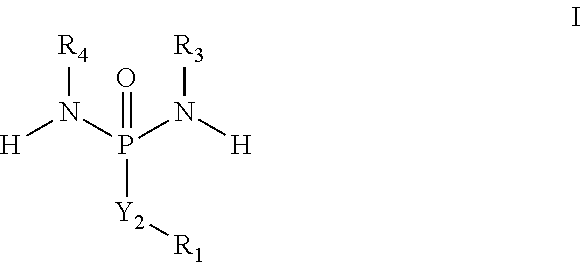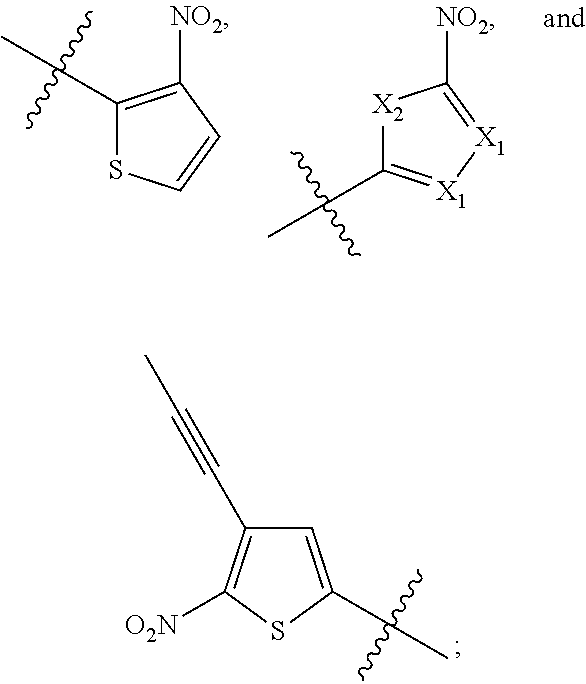Administration of hypoxia activated prodrugs and antiangiogenic agents for the treatment of cancer
a cancer and activated prodrug technology, applied in the field of cancer treatment by administration of activated prodrugs and antiangiogenic agents, can solve the problems of increased tumor hypoxia, poor prognosis, tumor hypoxia,
- Summary
- Abstract
- Description
- Claims
- Application Information
AI Technical Summary
Benefits of technology
Problems solved by technology
Method used
Image
Examples
example 1
Sorafenib Induced Hypoxia in PLC / PRF / 5 Xenograft Tumor Bearing SCID Mice
[0099]The hypoxia level in another cancer, hepatocellular cancer PLC / PRF / 5, after sorafenib administration was also measured. The measurement was carried out as above, except that sorafenib was administered at 20 or 40 mg / kg once daily for 8 days. The PLC / PRF / 5 (HCC) tumor exhibits a baseline hypoxic fraction of 4.3%. Sorafenib induced a dose-dependent increase in tumor hypoxia volume: 4.3±0.4% with vehicle; 6.5±0.6% with 20 mg / kg sorafenib administration; and 9.3±0.7% with sorafenib 40 mg / kg. Significant increased hypoxia volume was observed in 20 mg / kg treated group (p<0.05 vs. vehicle) and 40 mg / kg treated group (p<0.001 vs. vehicle).
example 2
TH-302 Enhances Antitumor Activity of Antiangiogenic Agents
[0100]TH-302's anti cancer efficacy was demonstrated in combination with antiangiogenic therapy. Xenograft tumors were established by s.c. implantation of 5×106 786-O human renal cell carcinoma (RCC), 5×106 A375 melanoma, or 1×106 H460 human non-small cell lung cancer (NSCLC) cells into the flanks of nude mice, or 5×106 PLC / PRF / 5 hepatocellular carcinoma (HCC) into the flanks of Severe Combined Immunodeficient (SCID) mice. Tumor hypoxia was detected by pimonidazole immunostaining, and morphometric analysis was performed to determine the hypoxic fraction. When tumor size was approximately 100-150 mm3, sunitinib or sorafenib was administered daily. Sunitinib at 20, 40, or 80 mg / kg was administered p.o. daily for 3 weeks (QDx21). For all of these studies except the study utilizing the A375 melanoma model, TH-302 administration began one week after antiangiogenic agent administration. In the A375 melanoma model, TH-302 administr...
example 3
Clinical Administration of TH-302 with Sunitinib for the Treatment of Advanced Renal Cell Carcinomas, Gastrointestinal Stromal Tumors and Pancreatic Neuroendocrine Tumors
[0106]Clinical investigations demonstrate the safety, tolerability and clinically relevant disease responses of TH-302 in combination with sunitinib administered to patients with renal cell carcinoma, gastrointestinal stromal tumors or pancreatic neuroendocrine tumors in accordance with the methods of the invention. Sunitinib is administered orally daily on Day 1 through Day 28 of a 42 day cycle. TH-302 is administered as a 30 to 60 minute intravenous infusion once a week on Day 8, Day 15 and Day 22 of the 42 day cycle. Patients who successfully completed a 6-week treatment cycle without evidence of significant treatment-related toxicity or progressive disease are continued on treatment and can receive treatment for up to six cycles. In other embodiments, additional cycles may be administered.
[0107]One patient with ...
PUM
| Property | Measurement | Unit |
|---|---|---|
| partial pressure | aaaaa | aaaaa |
| volume | aaaaa | aaaaa |
| molecular weight | aaaaa | aaaaa |
Abstract
Description
Claims
Application Information
 Login to View More
Login to View More - R&D
- Intellectual Property
- Life Sciences
- Materials
- Tech Scout
- Unparalleled Data Quality
- Higher Quality Content
- 60% Fewer Hallucinations
Browse by: Latest US Patents, China's latest patents, Technical Efficacy Thesaurus, Application Domain, Technology Topic, Popular Technical Reports.
© 2025 PatSnap. All rights reserved.Legal|Privacy policy|Modern Slavery Act Transparency Statement|Sitemap|About US| Contact US: help@patsnap.com



